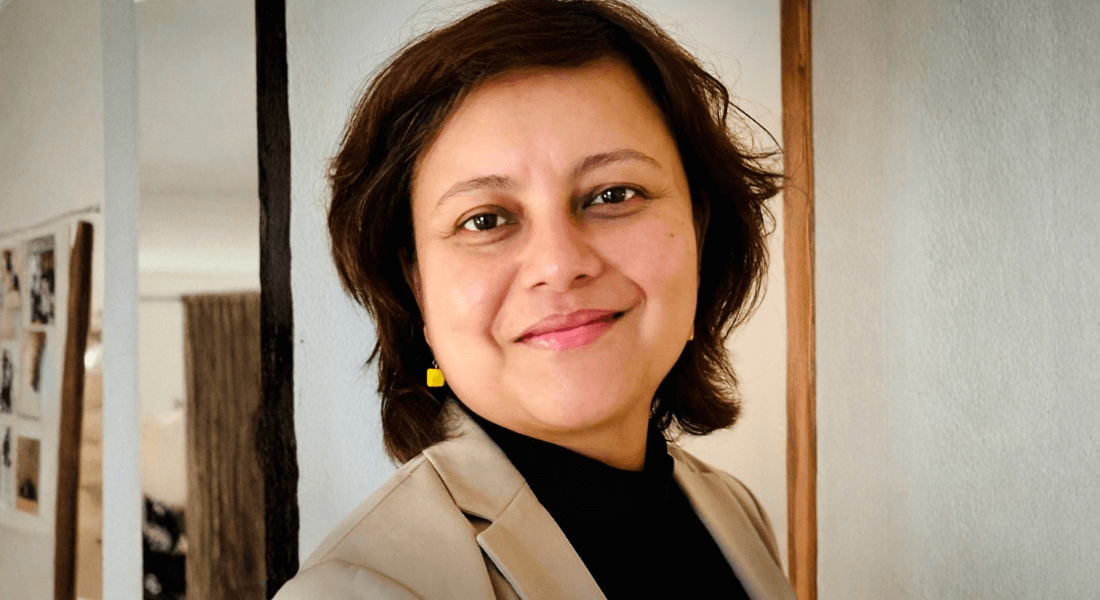Manisha Nair: Improving women’s cardiometabolic health in pregnancy
Meet Manisha Nair, a newly appointed Professor of Global Health at the Global Health Section, University of Copenhagen. In this spotlight, Manisha reflects on her work and research within women’s cardiometabolic health in pregnancy.

Tell us about your work
My research is driven by a passion to improve outcomes for women who develop heart and metabolic diseases during pregnancy and to reduce their lasting effects across generations. I’m equally committed to advancing global health equity by ensuring access to affordable diagnosis and care.
In 2018, I founded the Maternal and Perinatal Health Research Collaboration, India (MaatHRI), a network of 16 hospitals working together to improve maternal health through research and innovation. One of our studies exposed a heart-breaking truth: nearly half of all pregnant women with suspected heart failure died within hours of reaching the hospital, without timely cardiac assessment.
This inspired the ongoing AI-FoCUS Solutions project, which harnesses artificial intelligence to interpret heart scans in real time, empowering non-specialists to make rapid, life-saving decisions in primary care, obstetric and emergency settings.
Why is this work important?
Women’s heart and metabolic health during their reproductive years has long been overlooked, and the numbers tell a worrying story. Between 1990 and 2021, the global prevalence of hypertensive disorders of pregnancy rose from 6 million to over 36 million cases, and gestational diabetes now affects one in six pregnancies worldwide.
These conditions aren’t just temporary complications, they’re powerful predictors of a woman’s future risk of heart disease and diabetes, which together account for millions of deaths each year. Pregnancy, therefore, offers a crucial window to identify and reduce these risks early.
By focusing on women’s cardiometabolic health in pregnancy, my research seeks to break this cycle, protecting not only mothers, but also the next generation from preventable heart and metabolic disease.
What excites you about your work?
What excites me most about my work is its potential to create lasting, positive change in global health. My research is needs-driven, rooted in real-world challenges, and constantly inspired by curiosity and innovation. I’m energized by the opportunity to think creatively and find practical solutions that can transform how healthcare is delivered and accessed.
At the same time, I’m motivated by the stark gender, global, and social inequalities that persist in health despite remarkable scientific progress. Bridging that gap between innovation and impact to reduce these inequalities is what drives me every day. Collaboration across disciplines keeps my research dynamic and forward-looking, while creating shared scientific resources and mentoring emerging global health researchers ensures that our collective work continues to make a difference.
Where do you see yourself in 10 years?
I hope to see pregnancy-related cardiometabolic diseases recognised globally as a critical public health priority, one that demands investment, innovation, and urgent action. My vision is to build a strong evidence base that drives policy change, improves care for women, and reduces the intergenerational impact of these conditions.
As someone who has personally experienced a pregnancy-related cardiometabolic disorder, this work is deeply personal. I want to help rewrite the future for millions of women like me to turn what often feels inevitable into something preventable.
The challenges are immense: rapid epidemiological transitions, climate change, and shifting demographics are all fuelling an exponential rise in these complications. India, where my research is based, is at the epicentre, but this is a global issue. Over the next decade, I hope to rally funders, policymakers, and researchers worldwide to confront this growing threat and ensure healthier futures for women and their children.
What advice do you have for junior researchers in global health?
I have supervised students and junior researchers from more than eighteen countries and I have advised them to not to be a ‘parachute researcher’. Too often, researchers enter a country, collect data, publish papers, and leave without giving back. This approach breeds distrust and exploitation. True global health research must be rooted in respect, reciprocity, and partnership. We have an ethical responsibility to co-create research, use outputs to improve health outcomes, and help strengthen local capacity. That’s how we create impact that endures.
Over the years, I’ve learned that collaboration takes time, but it’s always worth it. Early in my career, I made mistakes by avoiding co-creation to drive things faster. Those experiences taught me that genuine collaboration not only improves the quality of research, but it also builds ownership, trust, and sustainability.
Finally, to every aspiring researcher: be tenacious, kind, and respectful. Global health is full of challenges, but if you stay curious, collaborative, and mindful of your and other’s wellbeing, you’ll help shape a fairer and healthier world.
What is your favourite source of global health inspiration and knowledge?
People are my greatest source of inspiration and knowledge in global health. My teachers, mentors, collaborators, students, staff, and most importantly the research participants, have all shaped my journey in profound ways. Each has taught me something different about science, resilience, and compassion.
I’ve been fortunate to be guided by exceptional women leaders who helped me navigate the unique challenges of building a career in global health as a woman. I’ve also learned from difficult experiences and from those who undermined my abilities; they strengthened my resolve and shaped my perspective.
But what inspires me most are the people whose lives my research touches. I still think of one collaborator who wrote to say that our findings on iron deficiency in pregnancy gave her the confidence to insist on treatment she was denied. Those moments remind me why I do this work. In the end, people—our relationships, empathy, and shared purpose—are, and will always be, at the heart of global health research.
Contact
Manisha Nair
Professor of Global Health, Section of Global Health, Department of Public Health, University of Copenhagen
manisha.nair@sund.ku.dk
